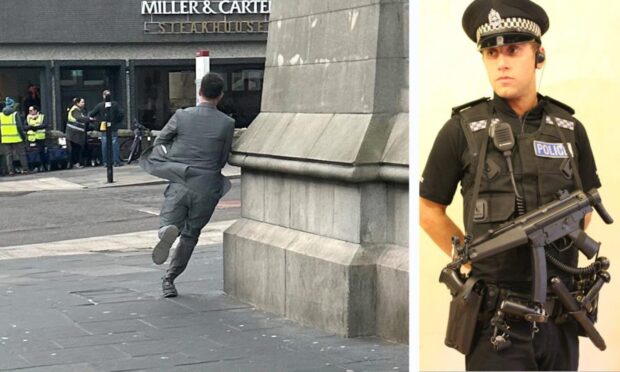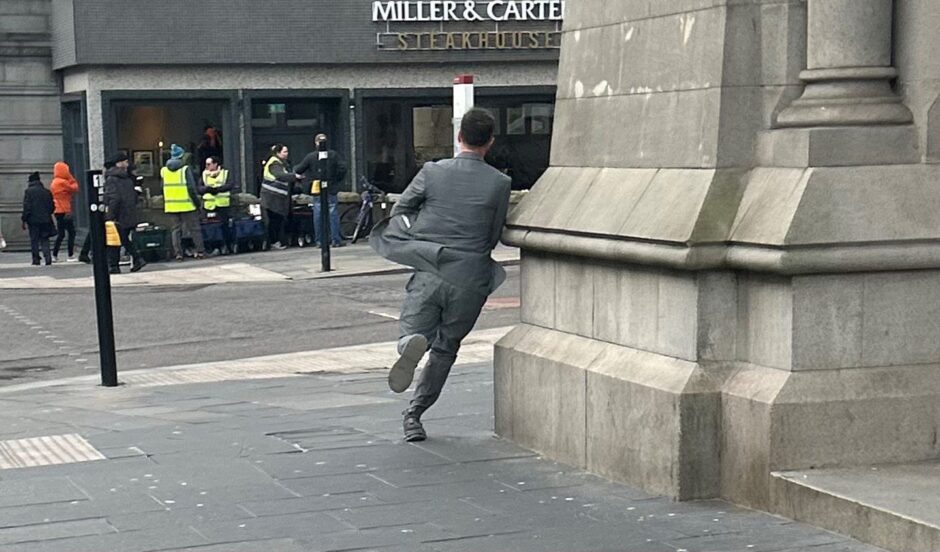An Aberdeen stripper who was found guilty of sexually assaulting two women during a hen party performance has failed in a bid to have his convictions quashed.
Stuart Kennedy – who goes by the name Sergeant Eros – was placed on the sex offenders register for sitting on one woman’s lap and rubbing his body against another.
Aberdeen Sheriff Court heard how the 40-year-old repeatedly tried to embrace the first woman during the May 2022 performance at a venue in the city called the Cellar.
Both women objected to Kennedy’s behaviour and he was prosecuted for sexual assault. He had been arrested on several previous occasions for alleged offences relating to his performances.
Sheriff Andrew Miller ordered Kennedy to be supervised by the authorities for 12 months and placed him on the register for the same period of time.
Passing sentence, Sheriff Miller told Kennedy he was being convicted because the law states “that no one should be subjected to unwanted sexual activity” and that this applied just as much to a strip performance.
Lawyers for Kennedy believed their client had been wrongly convicted.
They believed that Sheriff Miller had wrongly understood the law – arguing that because the incidents took place within the context of a theatrical performance, it did not pass the legal tests needed to convict him of sexual assault under the terms of the 2009 Sexual Offences Scotland act.
His legal team addressed judges at the Sheriff Appeal Court earlier this year.
Small piece of cloth covered private parts
In the written judgement published today, Sheriff Principal Sean Murphy KC wrote of how Kennedy began his performance at about 10.30pm.
He writes of how Kennedy was dressed in a firefighter’s costume.
After delivering some comments “which were designed to be amusing”, Sheriff Murphy wrote of how Kennedy “removed most of his clothing except for a small piece of cloth about the size of a face towel which covered his private parts.”
He then stood behind the organiser and pretended to pat her down for “flammable substances” by moving his hands up and down in the area of her breasts over her clothing before simulating sexual acts with her.
Sheriff Principal Murphy wrote: “She found the performance amusing and not offensive.”
However, the two other women did object after being assaulted by Kennedy which led to him being convicted.
‘The acts described by the complainers were carried out deliberately’
Dismissing the arguments made to the court by Kennedy’s lawyers, Sheriff Principal Murphy, who sat with colleagues Appeal Sheriffs Christopher Shead and Patrick Hughes, wrote: “The appellant’s position that this was a form of sexualised entertainment is not a defence to either charge in our view.
“Sexualised entertainment is sexual in nature by definition. The acts described by the complainers were carried out deliberately in each case and the motivation behind these deliberate acts is not a relevant consideration in relation to the question of dole or mens rea.
“If the constituent elements of a contravention of section 3 of the 2009 Act are made out, the accused’s motivation is irrelevant.
“The evidence indicated that he was registered with Equity and had had operated a business since 2006 which provided sexualised entertainment and which carried public liability insurance.
“His purpose was to deliver the type of entertainment which he had been hired to provide and the issue in the case related to the nature of his performance rather than any question of his seeking to obtain sexual gratification on his own part.
“If his performance had not involved actual physical contact with members of his audience the position could have been very different.
“We agree with the Crown’s submission that the provisions of the 2009 Act are designed to preserve the sexual autonomy of a complainer.
Appeal refused
“The statute emphasises the centrality of consent as marking the boundary between criminal and non-criminal sexual conduct and it is the non-consensual nature of the appellant’s behaviour in a sexual context which renders his conduct criminal in this case, and, as we have indicated, we agree with the sheriff’s assessment of the circumstances in this case in relation to the sexual nature of the appellant’s behaviour.
“It follows that we shall… refuse this appeal.”
Passing sentence in January 2024, Sheriff Miller told Kennedy: “On the evening of May 14 2022 you performed as a stripper at a social function, in the course of a business which you have operated for a number of years, having been booked to give that performance by the organiser of the function.
“In the course of your performance, you had physical contact of a sexual nature with two women who had attended the function, without their consent, in circumstances which amounted to the crime of sexual assault.
“It was clear to me from the evidence led at trial that both of the complainers made it clear prior to you approaching and having physical contact with them in the course of your performance, that they did not want to have any such contact with you and that they did not wish to be involved in your performance.”
‘No person can overcome a female’s sexual autonomy’
In his closing statement during the trial, fiscal depute Andrew McMann said: “It is my position, and I echo that of the complainers, that no person, including the accused, can overcome a female’s sexual autonomy and right to consent or withdraw consent just because he is putting on a performance as a stripper.
“Nor does the law on consent stop being law just because a person hiding behind the guise of committing criminal acts during a hired performance.”
Lawyers for Kennedy believed this was a mistaken interpretation of the law.
Kennedy has previously been arrested dozens of times for alleged offences linked to his performances, including allegedly impersonating a police officer.
He has also been accused of possession of an offensive weapon – his truncheon and a fake CS spray – and for allegedly fitting a flashing light to his car.

